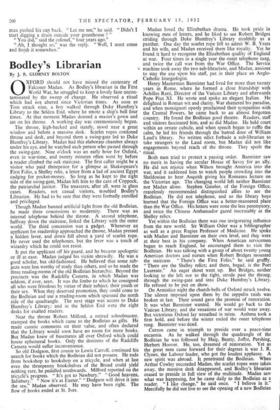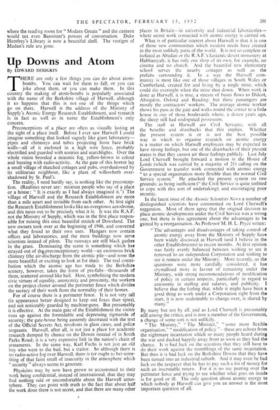Bodley's Librarian
By J. R. GLORNEY BOLTON
OXFORD should not have missed the centenary of Falconer Madan. As Bodley's librarian in the First World War, he struggled to keep a lovely fane uncon- taminated by the sweep of change. He observed a ritual which had not altered since Victorian times. As soon as Tom struck nine, a boy walked through Duke Humfrey's Library to the Selden End, where he smote a ship's bell four times. At that moment Madan donned a master's gown and sat on his throne. A working day was ceremoniously begun.
The throne, high-backed and stately, stood near a great window and before a massive desk. Scarlet ropes cordoned throne and desk, and beyond them a swing-gate led to Duke Humfrey's Library. Madan had this elaborate chamber always under his eye, and he watched each person who passed through the swing-gate. Nine o'clock was an early hour for Oxford, even in war-time, and twenty minutes often went by before a reader climbed the oak staircase. The first caller might be a visitor who paid threepence for a glimpse at Shakespeare's First Folio, a Shelley relic, a letter from a lad of ancient Egypt cadging for pocket-money. So long as he kept to the right side of the swing-gate, Madan left him to the care of Coppock, the patriarchal janitor. The treasures, after all, were in glass cases. Readers, not casual visitors, troubled Bodley's Librarian. He had to be sure that they were forthally enrolled and privileged.
Though Madan banned artificial light from the old Bodleian, he made three concessions to modernity. There was an internal telephone behind the throne. A second telephone, halfway down the staircase, linked the Library with the outer world. The third concession was a gadget. Whenever an applicant for readership approached the throne, Madan pressed a hidden lever, and down fell about a yard of scarlet rope. He never used the telephones, but the lever was a touch of wizardry which he could not resist.
It put the applicant off his and he became apologetic or ill at ease. Madan judged his victim shrewdly. He was a good scholar, but old-fashioned. He believed that some sub- jects were less worthy of study than others, and so he made the three reading-rooms of the old Bodleian hierarchic. Beyond the precincts was the Radcliffe Camera, in which Madan was seldom; if ever, seen. It was the limbo to which he consigned all who were frivolous by virtue of their subject, their youth or their sex. When they deserved promotion, they could come to the Bodleian and use a reading-room which spanned the north side of the quadrangle. The next stage was access to Duke Humfrey's Library; and in the Selden End were the eight desks for exalted readers.
Near the throne Robert Milford, a retired schoolmaster, stamped the books which came to the Bodleian as gifts. He made caustic comments on their value, and often declared that the Library would soon have no room for more books. But Madan knew of basements all over Oxford which could house ephemeral books. Only the denizens of the Radcliffe Camera would suffer inconvenience.
So old Dodgson, first cousin to Lewis Carroll, continued his search for books which the Bodleian did not possess. He rode from bookshop to bookshop on a tricycle, and when at last even the threepenny bOokshelves of the Broad could yield nothing rare, he pedalled southwards. Milford reported on the tricycle's progress. " It's got to Newbury." " Good heavens, Salisbury." " Now it's at Exeter." " Dodgson will drive it into the sea," Madan observed. He may have been right. The flow of books ended at St. Ives. Madan loved the Elizabethan drama. Ile took pride in knowing men of letters, and he liked to see Robert Bridges striding through Duke Humfrey's Library stealthily as a panther. One day the scarlet rope fell to. admit W. B. Yeats and his wife, and Madan received them like royalty. Yet he found it hard to recognise the Elizabethan quality of England at war. Four times in a single year the outer telephone rang, and twice the call was from the War Office. 'Thi Service * machine took away the two sub-librarians, and Madan, anxious to stay the axe upon his staff, put, in their place an Anglo- Catholic liturgiologist.
Henry Masterman Bannister had lived for more than twenty years in Rome, where he formed a close friendship- with Achilles Ratti, Director of the Vatican Library and afterwards Pope Pius XI. He wrote and spoke an elegant Italian. He delighted in Roman wit and clarity. War shattered his paradise, and when monsignori openly proclaimed their sympathies with the Central Powers, he came back to an almost forgotten country. He found the Bodleian good theatre. Readers, staff and visitors fascinated him, and so did Madan. He held court within an ornate cubicle, and when speech began to ruffle the calm, he led his friends through the barred door of William Laud's library. No written edict forbade a sub-librarian to take strangers to the Laud room, but Madan did not like engagements beyond reach of the throne. They spoilt the ritual.
Both men tried to protect a passing order. Bannister saw no merit in having the secular House of Savoy for an ally. He did not rejoice when Wilson brought America into the war, and it saddened him to watch people crowding into the Sheldonian to hear Asquith giving his Romanes lecture on the Victorian age. The changing world left neither Bannister nor Madan alone. Stephen Gaselee, of the Foreign Office, ceaselessly recommended distinguished allies to see the Bodleian. He did not telephone, and so the library boys learned that the Foreign Office was a better-mannered place than the War Office. His letters were none the less peremptory, and twice the Chinese Ambassador gazed inscrutably at the Shelley relics.
Yet within the Bodleian there was one invigorating influence from the new world. Sir William Osier was a bibliographer as well as a great Regius Professor of Medicine. He spoke with Madan and Bannister on their own level, and the' were at their best in his company. When American servicemen began to reach England, he encouraged them to visit the Bodleian. He was talking with a group of about twenty young American doctors and nurses when Robert Bridges mounted the staircase. " There's the First Folio," he said gruffly. " There are the Shelley relics; and there, begad, is the Poet Laureate." An eager shout went up. But Bridges, neither looking to the left nor to the right, strode past the throng, through the swing-gate and into Duke Humfrey's Library. He refused to be put on show.
On Armistice night the church-bells of Oxford struck twelve. The silence imposed upon them by the zeppelin raids was broken at last. Their sound gave the promise of restoration. It was what Bannister wanted. He would go back to the Vatican Library, and the vexations of war would wear away. But victorious Oxford lay wreathed in mists. Asthma took a firm hold, and before the winter ended the outer telephone rang. Bannister was• dead.
Curzon came in triumph to preside over a peace-time encaenia. As he walked through the quadrangle of the Bodleian he was followed by Haig, Beatty, Joffre, Pershing, Herbert Hoover. He, too, dreamed of restoration. Yet as the great men came forward for their degrees it was J. R. Clynes, the Labour leader, who got the loudest applause. A new Spirit was abroad. It penetrated the Bodleian. When Arthur Cowley succeeded Madan, the scarlet ropes were taken away, the massive desk disappeared, and Bodley's librarian ceased to preside in full view of the multitude. Madan saw what was happening, for he came daily to the Bodleian as a reader. " I like change," he said once. " I believe in it." Mercifully he did not live to see the opening of a new Bodleian where the reading room for " Modern Greats " and the canteen would tax even Bannister's powers of conversation. Duke Humfrey's Library is now a beautiful shell. The vestiges of Madan's rule are gone.



























 Previous page
Previous page